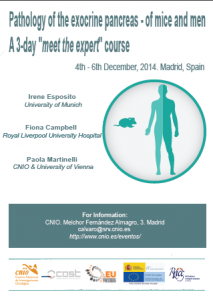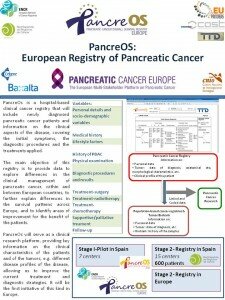WG1: Harmonization of research tools
Description
 Research tool harmonization will address and reach a consensus on the following issues: (i) Definition of PDAC and establishment of widely accepted pertinent terminology (pathological staging system, pathological subtypes, definition of preneoplastic lesions, genetic profiling, definition of high risk patients etc.); sporadic, hereditary and familial pancreas cancer will be considered; (ii) These data will be contrasted and compared across all groups and countries, and across settings and contexts. This comparison will identify commonalities and differences and explore key variables that cut across different cases. These variables will be built into the tools established; (iii) Development of protocols for patient enrolment as well as for monitoring; (iv) Standardization of biological sample collection, processing and storage protocols as well as of epidemiological and clinical questionnaires. This also includes an assessment of the ability of participating centers to follow uniform protocols for sample collection and databasing; and (v) Establishment of criteria to assess the quality of existing body fluid and tissue banks for pancreas cancer research to enhance the distribution of biological material from patients with PDAC within Europe.
Research tool harmonization will address and reach a consensus on the following issues: (i) Definition of PDAC and establishment of widely accepted pertinent terminology (pathological staging system, pathological subtypes, definition of preneoplastic lesions, genetic profiling, definition of high risk patients etc.); sporadic, hereditary and familial pancreas cancer will be considered; (ii) These data will be contrasted and compared across all groups and countries, and across settings and contexts. This comparison will identify commonalities and differences and explore key variables that cut across different cases. These variables will be built into the tools established; (iii) Development of protocols for patient enrolment as well as for monitoring; (iv) Standardization of biological sample collection, processing and storage protocols as well as of epidemiological and clinical questionnaires. This also includes an assessment of the ability of participating centers to follow uniform protocols for sample collection and databasing; and (v) Establishment of criteria to assess the quality of existing body fluid and tissue banks for pancreas cancer research to enhance the distribution of biological material from patients with PDAC within Europe.
| Coordinator | Irene Esposito ([email protected]) |
| Co-leaders | Malte Buchholz, Eric Duell |
| Members | Mustafa Adhan, Sinéad Aherne, Laufey Amundadottir, Livia Archibugi, Masoud Babaei, Giedrius Barauskas, Stefania Bocca, Cristina Bosetti, Malte Buchholz, Paul Brennan, Hermann Brenner, Bas Bueno-de-Mesquita, Louis Buscail, Fiona Campbell, Cindy Canivet, Federico Canzian, Gabriele Carpuso, Timur Ceric, Eithne Costello-Goldring, Christian Cotsuglou, Tatjana Crnogorac-Jurcevic, Christos Dervenis, Petr Dite, Vita Dolzan, Eric Duell, Irene Esposito, Jerome Extermann, Massimo Falconi, K. Forslund, Edoardo Forti, Adelaida García Velasco, Paulina Gómez, Bill Greenhalf, Sibylle Guendisch, Tim Kacprowski, Olaf Kelm, Guenter Kloppel, Elin Kure, Carlo La Vecchia, Pagona Lagio, Gabor Lakatos, Huang Lei, Drazenka Macić, Patrick Maissoneuve, Núria Malats, Rafael Marcos Gragera, Paola Martinelli, Alba de Martino, Mirari Márquez, Julia Mayerle, Vicenzo Mazzafero, Dominique Michaud, Pamela Minicozzi, Esther Molina-Montes, Anders Molven, Massimiliano Mutignani, Julie Perinel, Irinel Popescu, Miquel Porta, Michele Reni, Graf Rolf, Ralph Rühl, Valentina Rosato, Romano Sassatelli, Ghislaine Scelo, Diego Serranio, Linda Sharp, Marianna Signoretti, Sonja Eriksson Steigen, Serena Stigliano, Davor Stimac, Andrea Szentesi, Roberto Valente, Giuseppe Vanella, Jesús Vioque, Weimin Ye, Alessandro Zerbi, Giulia Zerboni. |
Research Lines
Pathology (coordinated by Irene Esposito)
Focus on:
- Comparison across groups and countries, and across settings and contexts, of definitions and terminology for sporadic, hereditary and familial pancreas cancer
- Standardized definition of PDAC and establishment of key terminology.
- Short-term treatment of insomnia.
Epidemiology (coordinated by Eric Duell)
Focus on:
- Development of protocols for patient enrolment and monitoring
- Standardization of epidemiological and clinical questionnaires
Molecular Biology (coordinated by Malte Buchholz)
Focus on:
- Standardization of biological sample collection, processing and storage protocols
- Establishment of criteria to assess the quality of existing biobanks for pancreas cancer research
- Interconnection about biorepositories and databases
Activities
1) Pathology workshop/training school, organized by Irene Esposito, Fiona Campbell and Francisco X. Real, on December 4th-6th 2014 in Madrid, Spain.

This 3-day workshop was aimed at pathologists, physicians and researchers with special interest in the field of pancreas research.
Experts in the field provided detailed knowledge about pathology and genetics of the main inflammatory and neoplastic diseases of the pancreas, as well as on current animal models for pancreatic diseases.
Specific topics were: normal anatomy and histology of the human and murine pancreas; acute and chronic pancreatitis; mouse models for pancreatitis; pancreatic ductal adenocarcinoma - pathology & genetics;
cystic and intraductal tumors of the pancreas- pathology & genetics; specimen handling and reporting; neuroendocrine neoplasms; mouse models for pancreatic exocrine & endocrine tumors; diagnostic pitfalls.
+ poster
+ detailed information
2) On-site visit of the National Center for Tumor Diseases (NCT) and European Pancreas Center (EPZ) biobanks in Heidelberg, Germany (April 27th, 2015).
Members from different workgroups of COST Action BM1204 visited the NCT and EPZ biobanks and were informed by the biobank leaders, Esther Herpel (NCT) and Nathalia Giese (EPZ), about organizational features, protocols and standard operating procedures that are in place at these facilities.
Both biobanks are also in close collaboration with national and international biobanking initiatives (see e.g. https://www.bbmri-eric.eu/)
3) Epidemiological questionnaires to be used by the pancreas cancer research community.
WG1 produced a set of standardized epidemiological questionnaires (a core questionnaire augmented by several additional documents to cover more specialised fields of interest) that are offered to the scientific community as a basis for harmonizing epidemiological research on pancreatic diseases across Europe.
EUPancreas_CORE Questionnaire
EUPancreas_CORE Questionnaire_GUIDELINES
EUPancreas_Optional Questionnaire - Smoking
EUPancreas_Optional Questionnaire - Beverages
EUPancreas_Optional Questionnaire - Medical_History
EUPancreas_Optional Questionnaire - Work exposure
EUPancreas_Optional Questionnaire_- Anthropometry & Physical Activity
4) EUPancreas-SOP for pancreatic cancer biobanking to be used by the pancreas cancer research community.
WG1 developed this Standard Operating Procedure (SOP) to harmonize the process pancreatic cancer tumour tissue biobanking across Europe, so as to provide optimally preserved tissue for research.
EUPancreas_SOP
EUPancreas_ConsentForm
5) European Pancreas Cancer Epidemiology Workshop and 2016 Pancreatic Cancer Case Control Consortium (PanC4).
WG1 members met to discuss about research undertaken in Europe on pancreatic cancer. On the following day the meeting continued jointly with the Panc4 consortium, starting with sessions dedicated to microbiome and pancreatic cancer risk. The afternoon session highlighted updates of ongoing projects on pancreatic cancer in the epidemiological research field.
 PancreOS: an European Registry of Pancreatic cancer
PancreOS: an European Registry of Pancreatic cancer
PancreOS is intended to be a solid data base of pancreatic cancer, which will make available regular information on the burden and clinical management of pancreatic cancer in Europe. It is supported by several organisations, including the BM1204 COST Action EUPancreas, the European Network of cancer registries (ENCR) and Pancreatic Cancer Europe (PCE).
The pilot study in Spain was launched in September 2015.
The PancreOs kick-off meeting was held in Madrid on 17th March 2016.
Networking
PanC4: contact exist through Carlo, Núria and Eric
ICGC: contact has been established for the whole action by Núria
SPIDIA (https://www.spidia.eu/), m4 biobank alliance (https://m4.de/): contact established by Irene
